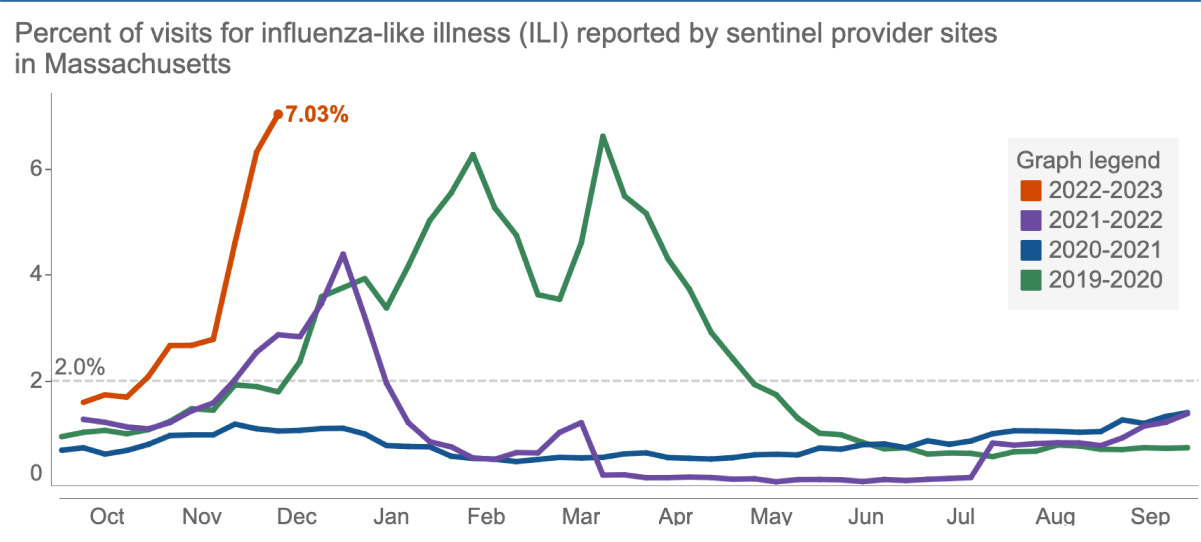Flu rates in Massachusetts are already higher than at any point in more than a decade, and the season is just getting started.
Data released Friday by the state Department of Public Health shows more than 7% of patients who saw an outpatient doctor last week had flu-like symptoms. The state uses that as an indicator for how prevalent influenza is, since relatively few people wind up taking a test for the flu.
"I don't think we've seen activity like this since the swine flu, the H1N1 pandemic of 2009 ," said Dr. Larry Madoff, medical director for the state DPH's bureau of infectious disease and lab sciences. "And that was a very high and unusual season. We haven't seen anything like this since then."
Right now, flu numbers are increasing far more rapidly than COVID-19 numbers, said Dr. Daniel Kuritzkes, chief of the division of infectious diseases at Brigham and Women's Hospital.
"Whereas we typically see influenza striking in January, February, there's really been a rapid rise now in December that parallels the rise we've seen in previous years in later winter months," Kuritzkes said. "But it's just happening that much earlier."
Essentially, it's spiked early, and it's not clear if it will also go down early or continue to rise.
"We don't know what's going to happen next," Madoff said.

The DPH also reported that 3.6% of hospitalizations statewide last week were associated with influenza. Higher percentages were seen in the 2019-2020 season, but not until February.
"Fortunately, people tend not to get quite as sick with influenza as with COVID," Kuritzkes said.
"So I don't expect that we're going to see dozens and dozens of people on ventilators or in the intensive care unit," he said. "But everybody with influenza needs to be in a private room or roomed with someone else with influenza. That clearly has an impact on capacity and how we can handle folks."
Those capacity issues could ultimately affect hospitals' ability to admit new patients and conduct elective procedures, he said.
"I would urge everybody to go out and get their flu vaccine if they haven't done it yet," Kuritzkes added.
The state reported that 39% of Massachusetts residents have gotten a flu shot so far this year. Madoff said that's on par with previous years at this point in the season. But with the flu spiking earlier than usual, there's an added urgency to getting the shot, said Dr. Sari Sánchez, medical director for infectious diseases at the Boston Public Health Commission.
"We're definitely urging our communities to get their annual flu vaccines and to really stay home if they feel sick," Sanchez said. "And we are really trying to address that with access to sites."
The city has set up free, walk-in flu vaccination clinics around Boston. A list of Boston sites is available here and a state list of vaccination locations can be found here .
More Local News
The weekly state reports shows stark disparities in flu vaccination by age and race or ethnicity.
Nearly 70% of people aged 65 or older have gotten a flu shot, compared to just 28% of Massachusetts residents between the ages of 18 and 49.
Forty percent of white people in the state have gotten a flu vaccination, compared to 28% of Black residents and just 23% of Hispanic people.
"We know the disparities have historically existed where communities of color, particular Black and Latinx communities, often have lower rates of vaccination uptake," Sanchez said. "And we've also often seen historically that they that we also see higher rates of influenza in these communities."
More than half of flu cases in Boston are in Black and Latino people, she said, with residents of Dorchester, Roxbury and Hyde Park being disproportionately hit.
"We also recognize that there might be a lot of fatigue out there. You know, we've had many vaccines come out in the past two years," Sanchez said. "And we all need to continue to keep ourselves safe and healthy by being up to date on all of them."
Even with the average uptake, one bit of good news is that this year's version of the flu vaccine is believed to be an effective one.
"The strains that are in the flu vaccine match the ones that are circulating," Madoff said. "And that's not always true."
For those who do get the flu, he said, there are treatments available — particularly for people who are immunocompromised, over the age of 65 or very young.
"[They] are eligible and should talk to their health care provider about getting treatment for the flu," Madoff said. "It's most effective when given within two days of onset of symptoms. So it's important that if you think you're getting the flu, that you pick up the phone and call your provider."
Entering into the holiday season, experts say it's especially important to take precautions.
"The usual prevention measures of covering your cough, good hand hygiene and mask-wearing can help," Madoff said. "All of those things can can help prevent he transmission of flu. And hopefully we can put a lid on this season's flu outbreak."









